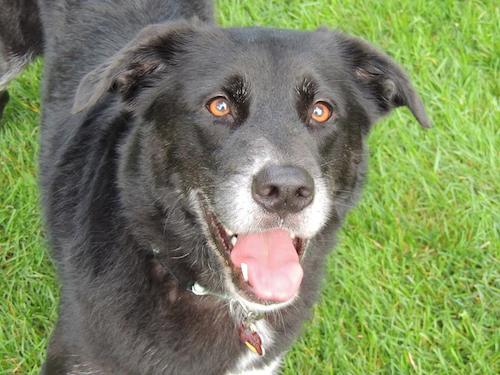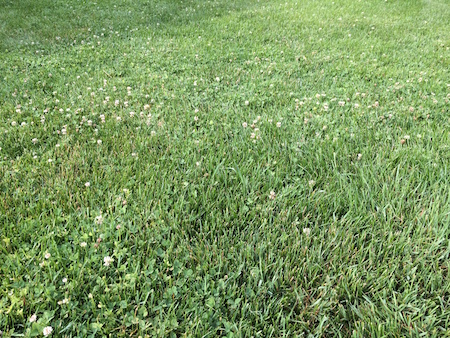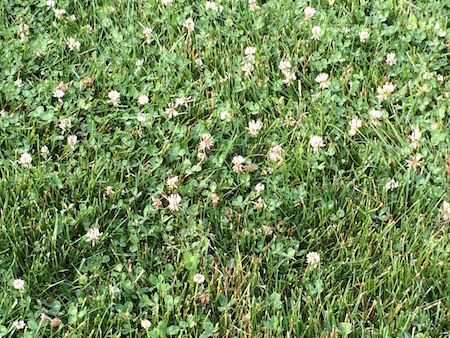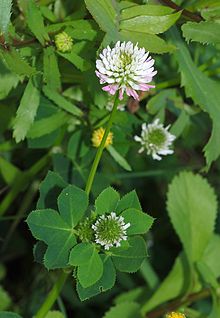Clover in the Lawn: Good or Bad?
The lush, green grass lawn is the goal, and dream, of the Suburban American. But keeping a healthy lawn full of nothing but grass requires lots of water, and lots of chemicals and herbicides to keep the weeds at bay. One of the most common 'weeds' in grass lawns is clover. But is there a place in the lawn for clover? Is clover good or bad for your lawn? Let's take a look at clover and examine why it might be a good idea to just let it be in your lawn.
Just because grass is the most common type of lawn plant doesn't mean we can't consider the alternatives.
Clover: An Alternative Green Carpet Lawn
What's the purpose of a lawn? A lush green lawn is an accent to the home and landscaping; it's also to serve as a natural surface for warm-weather outdoor living and playing. Obviously, grass has been the go-to for lawns for a long, long time. Anything that's not grass is kept away, usually with nasty chemicals and herbicides. One common weed is clover.
There are hundreds of types of clover, but the most common are Dutch clover and white clover.
Entire industries have been built around killing weeds. A quick Google search of 'clover in lawns' will provide you with link after link to sites offering advice on how to kill clover, and lots of chemical and herbicide treatment solutions. Blanketing lawns with weed-killers is common practice, but keeping some of them around, particularly clover, may be very beneficial to your lawn and the environment.
There are many advantages to keeping clover around in your lawn, co-existing peacefully with your green grass. Here are just a few:
- As anyone who's tried knows all too well, clover is very difficult to kill. Lots of herbicide is needed, and pulling it by hand is impossible.
- Clover stays green and lush all summer long with very little water, unlike grass. Clover is incredibly drought-resistant.
- Clover doesn't need to be mowed. Unlike grass which continues to grow upward until it's mowed, clover stays close to the ground.
- A clover filled lawn is very soft on bare feet.
- If the dog pees on it, clover will stay green. Grass is susceptible to yellow and dead spots where dogs use it as a bathroom.
- Unlike grass, which is very susceptible to disease and fungus, clover is resistant to almost all types of common lawn diseases. This reduces or eliminates the need for chemical treatments.
- Clover doesn't need to be fertilized. Grass requires frequent applications of fertilizer, often synthetic and toxic, to stay healthy and green. Clover stays green and healthy all summer long with no help.
- Clover fixes nitrogen. This means the clover plant is able to take nitrogen from the air and 'fix' it it in its roots in the soil. Basically, this means that clover provides its own nutrients and fertilizer, and improves the health of the soil at the same time.
- Clover has complex, thick root structures that aerate the soil, again improving its overall health.
- Clover attracts lots of beneficial insects, especially bees and honeybees. In a time when bee populations are dropping, clover lawns provide a new source of flowering plants that bees love.
- The little white clover flowers look nice against the deep green backdrop of the lawn.
Giving Up the Fight: Welcome, Clover!
This author spent years frantically trying to eradicate the spreading patches of clover in my lawn. I've spent hundreds of dollars and countless hours spraying clover, trying to pull it by hand, anything to get rid of it. But still, year after year, the clover thrives and spreads. It finally took me watching a bee bounce deliriously from clover flower to clover flower to realize that maybe the clover should stay. I don't see bees or other insects benefiting from all that grass I work so hard to keep healthy and green, but they love this maintenance-free clover. That sealed the deal for me: the clover stays.
comments powered by Disqus






































































